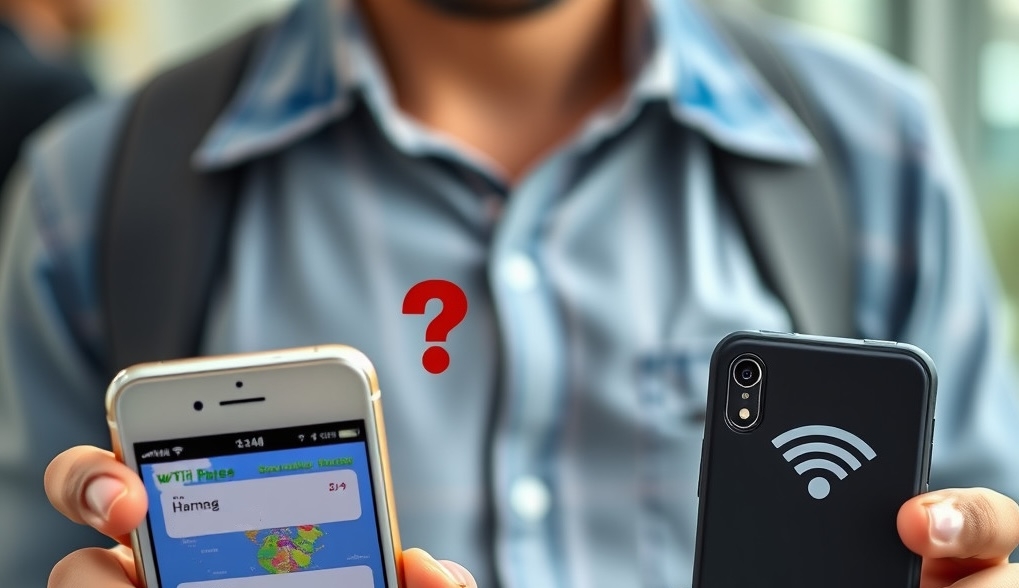International Plan or Pocket WiFi? Which One Should You Choose?
International plan or pocket WiFi? Discover which one suits your travel needs best.
Planning your next trip but not sure how to stay connected? You're not alone! Whether you're exploring new streets, sharing photos with friends, or checking work emails, reliable internet abroad makes a big difference. Let's dive into whether an international plan or pocket WiFi is the best choice for your travels.

Why Staying Connected Matters
Traveling brings amazing experiences, but it can also be challenging, especially when it comes to communication. From booking last-minute hotels to translating menus, internet access has become a must-have for travelers. Staying connected boosts safety, convenience, and enjoyment while exploring new places.
Safety First: Having access to maps and emergency contacts can be very important in places you don't know well.
Sharing Moments: Keeping in touch with loved ones and sharing experiences adds joy to the journey.
Work On The Go: For those who need to check in with work, a reliable connection keeps everything running smoothly.
Understanding International Plans
International plans are services from your mobile carrier that let you use your phone abroad. You can make calls, send texts, and use data like you do at home, but usually with extra charges.
How They Work
Your carrier partners with foreign networks to provide coverage in other countries. Before you leave, you activate the plan, and once you arrive, your phone connects automatically.
Activation: Contact your provider to add an international plan.
Compatibility: Make sure your phone is unlocked and works with international networks.
Automatic Connection: Your phone switches to a local network without any extra steps.
Pros and Cons
Pros:
Simplicity: No need to learn new setups or carry extra devices.
Convenience: Keep your usual phone number for calls and messages.
Seamless Use: Use your phone as you normally would, without changing settings.
Cons:
Costly Fees: International roaming can add up quickly.
Data Limits: Plans may have strict data caps or slower speeds after certain usage.
Limited Coverage: Some destinations may not be included, or coverage may be spotty.
Real-Life Example
Imagine you're on a business trip to London. With an international plan, you get a call from a client without worrying about dialing codes or missing the call. Everything works just like at home.

What Is Pocket WiFi?
Pocket WiFi is a portable device that acts as a mobile hotspot, providing internet access wherever there's cellular coverage. It's like having your personal WiFi router on the go.
How It Works
The device connects to local cellular networks and broadcasts a WiFi signal. You can connect multiple devices, like your phone, tablet, or laptop, at the same time.
Rental Process: Rent the device online or at the airport.
Setup: Turn it on and connect your devices using the provided password.
Coverage: Works anywhere within the supported network range.
Pros and Cons
Pros:
Multiple Connections: Great for traveling with family or multiple gadgets.
Flexible Plans: Often offers unlimited data options.
Cost-Effective: Share the cost among group members.
Cons:
Extra Device: Another gadget to carry and keep charged.
Rental Hassle: Needs to be picked up and returned, which requires planning.
Potential Fees: Late returns or damages may incur extra charges.
Real-Life Example
You're backpacking through Japan with friends. With pocket WiFi, you all connect your devices to a single hotspot, sharing photos, navigating trains, and staying in touch without worrying about individual plans.
Comparing Costs: International Plans vs Pocket WiFi
Budget is a big deal when traveling. Let's compare the expenses.
International Plans
Daily Fees: Many carriers charge a daily rate (e.g., $10 per day) for international access.
Monthly Packages: Some offer monthly plans with set data limits.
Overage Charges: Exceeding data limits can lead to hefty fees.
Example: Using your carrier's plan might cost $100 for a 10-day trip.
Pocket WiFi
Rental Rates: Typically a flat daily or weekly fee.
Unlimited Data: Some rentals offer unlimited data packages.
Deposit: May require a refundable security deposit.
Example: Renting a pocket WiFi could cost $50 for the same trip, often with unlimited data.
Watch Out for Hidden Costs
International Plans: Taxes, fees, and unexpected roaming charges.
Pocket WiFi: Late return fees, charges for loss or damage, extra accessories.

Convenience and Accessibility
Think about how each option fits your travel style.
International Plans
Ease of Use: Works as soon as you arrive—no setup needed.
No Extra Gear: Nothing additional to carry or worry about charging.
Familiarity: Use your phone just like at home.
Pocket WiFi
Setup Required: Connect your devices to the new WiFi network.
Battery Life: Needs regular charging; battery may last 8-12 hours.
Sharing: Allows multiple devices to connect, making it ideal for groups.
Accessibility for Tech-Savvy vs. Non-Tech-Savvy Travelers
International Plans: Great for those who prefer a straightforward approach without tinkering with gadgets.
Pocket WiFi: May appeal to travelers comfortable with setting up devices and managing connections.
Data Speed and Connection Quality
Internet speed can make or break your experience abroad.
International Plans
Variable Speeds: Depends on partnerships with local carriers.
Throttling: Some plans reduce speeds after using a certain amount of data.
Spotty Coverage: May experience weak signals in remote areas.
Pocket WiFi
Local Networks: Often uses high-speed local networks.
Reliable Speeds: Consistent connection, especially in urban areas.
Network Congestion: Can be affected during peak times.
Streaming and Heavy Data Usage
If you plan to stream movies or use data-intensive applications:
International Plans: Might not support high data usage without extra fees.
Pocket WiFi: Unlimited data plans can handle streaming and downloads.
Security Matters
Protecting your personal information is important.
International Plans
Secure Connection: Using your carrier reduces the need for public WiFi.
Less Risk: Fewer chances of connecting to unsecured networks.
Pocket WiFi
Private Network: Creates a personal hotspot secured with a password.
Safer Browsing: Better than using hotel or café WiFi, which might be unsecured.
Tips for Enhanced Security
Strong Passwords: Always set a robust password for your pocket WiFi.
VPN Usage: Think about using a Virtual Private Network for added protection.
Software Updates: Keep your devices updated to prevent vulnerabilities.

Matching Your Travel Style
Your choice might depend on how you travel.
Solo Travelers
International Plan: Simple and hassle-free for one person.
Pocket WiFi: Useful if carrying multiple devices.
Group Travelers
Pocket WiFi: Share the connection among friends or family, splitting the cost.
International Plans: Each person would need their own plan, which can be pricey.
Business Travelers
International Plan: Keep your number active for important calls.
Pocket WiFi: Ensures high-speed data for video conferences and large file transfers.
Long-Term Travelers
International Plan: May become expensive over extended periods.
Pocket WiFi: Rental costs can add up; think about alternatives like local SIM cards.
Alternatives to International Plans and Pocket WiFi
Exploring other options can lead to savings and flexibility.
Local SIM Cards
How It Works: Purchase a SIM card from a local provider.
Benefits:
Cost-Effective: Often cheaper rates for calls and data.
High-Speed Data: Access to local networks.
Things to Keep in Mind:
Phone Compatibility: Your phone must be unlocked.
New Number: You'll have a different phone number.
eSIMs
What Is an eSIM?: An embedded SIM that can be activated with a digital plan.
Benefits:
Convenience: No physical SIM card needed.
Flexibility: Switch between carriers and plans easily.
Things to Keep in Mind:
Device Compatibility: Not all phones support eSIMs.
Availability: Limited in some countries.
Free WiFi Hotspots
Advantages:
Cost-Free: No charges for usage.
Common Places: Found in cafés, hotels, airports.
Disadvantages:
Security Risks: Open networks may expose your data.
Unreliable Speeds: Slow connections during busy times.
Limited Access: Not always available when you need it.
Tips for Staying Connected Abroad
These tips can enhance your experience no matter which option you choose.
Check Coverage: See if your destination is included in the plan or device coverage.
Understand Fees: Be aware of any hidden costs or limitations.
Backup Options: Download offline maps and information in case of connectivity issues.
Stay Charged: Carry a portable charger, especially if using pocket WiFi.
Local Apps: Download apps that are popular in the destination country for better integration.
Language Tools: Install translation apps that work offline.
Emergency Contacts: Save important numbers accessible without internet.

Making the Decision: Which Is Right for You?
Choosing between an international plan and pocket WiFi depends on various factors.
Think About Your Budget
International Plan: May be suitable for short trips where convenience is key.
Pocket WiFi: Often more economical for longer stays or group travel.
Assess Your Data Needs
Light Usage: Checking emails and social media might not require unlimited data.
Heavy Usage: Streaming, video calls, and large downloads benefit from unlimited plans.
Think About Convenience
Ease of Setup: If you prefer minimal setup, an international plan wins.
Flexibility: Pocket WiFi offers more options for connecting multiple devices.
Evaluate Security Concerns
Trusted Network: Using your carrier might feel more secure.
Private Hotspot: Pocket WiFi provides a secure network for your devices.
Environmental Factors
Traveling responsibly includes thinking about environmental impacts.
Pocket WiFi Devices
Energy Use: Requires charging, consuming electricity.
Device Lifecycle: Manufacturing and disposing of devices impact the environment.
International Plans
Energy Savings: No extra devices reduce energy consumption.
Tips for Eco-Friendly Travel
Recharge Responsibly: Use energy-efficient chargers.
Device Care: Keep rental devices in good condition to extend their lifespan.
Reduce Waste: Limit printing tickets and confirmations by using digital versions.
Pros and Cons Summary Table
Feature | International Plan | Pocket WiFi |
|---|---|---|
Cost | Potentially high fees | Cost-effective for groups |
Convenience | Seamless use of your phone | Requires carrying an extra device |
Data Limits | May have caps or throttling | Unlimited plans often available |
Setup | Minimal setup required | Needs initial connection setup |
Device Compatibility | Uses your existing phone | Compatible with multiple devices |
Security | Secure connection via carrier | Private network with password |
Coverage | Depends on carrier agreements | Uses local networks, often broader |
Conclusion
Staying connected while traveling doesn't have to be complicated or expensive. International plans offer the ease of using your phone like you never left home, perfect for short trips or minimal internet use. Pocket WiFi provides flexibility and often better value, especially when heavy data use or multiple devices are involved. Think about your needs, weigh the pros and cons, and choose the option that makes your journey smoother. Safe travels!
FAQ
Can I use pocket WiFi in multiple countries during one trip?
Yes, some pocket WiFi providers offer devices that work across several countries. Be sure to confirm coverage areas before renting.
Will my phone work overseas with an international plan?
Most modern smartphones are compatible with international networks. Check with your carrier to make sure your device will work in your destination country.
Is pocket WiFi secure to use?
Yes, pocket WiFi creates a private network that's generally more secure than public WiFi hotspots. Always set a strong password.
Can I get unlimited data with an international plan?
Some carriers offer unlimited data options, but they may come with reduced speeds after a certain threshold. Read the plan details carefully.
Are there alternatives to international plans and pocket WiFi?
Yes, options include local SIM cards, eSIMs, or relying on free WiFi hotspots where available.
How do local SIM cards compare to pocket WiFi?
Local SIM cards can be cost-effective and provide high-speed data, but they require an unlocked phone and you'll receive a new local number. Pocket WiFi allows you to keep your original number and connect multiple devices.

I'm a digital nomad and travel enthusiast. I love exploring new places and sharing my experiences and tips with fellow travelers.

I'm a digital nomad and travel enthusiast. I love exploring new places and sharing my experiences and tips with fellow travelers.